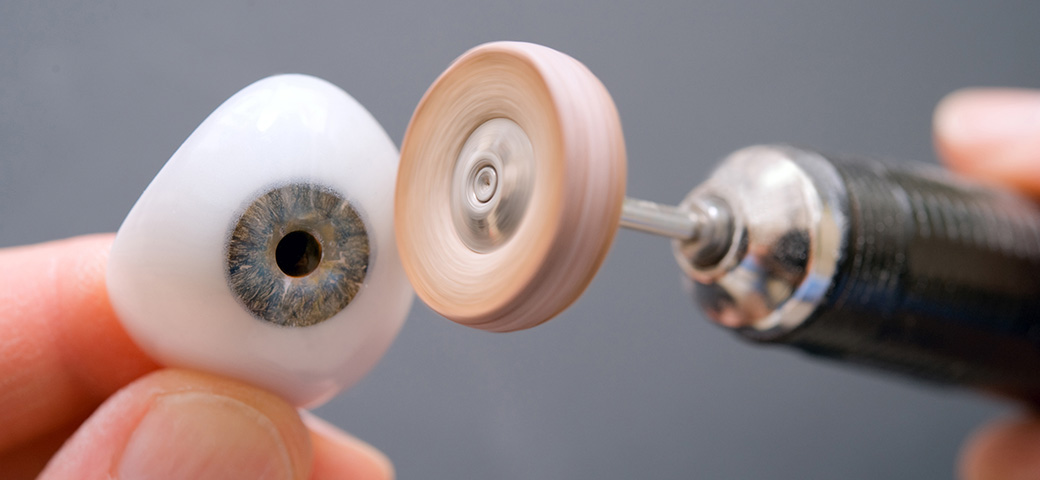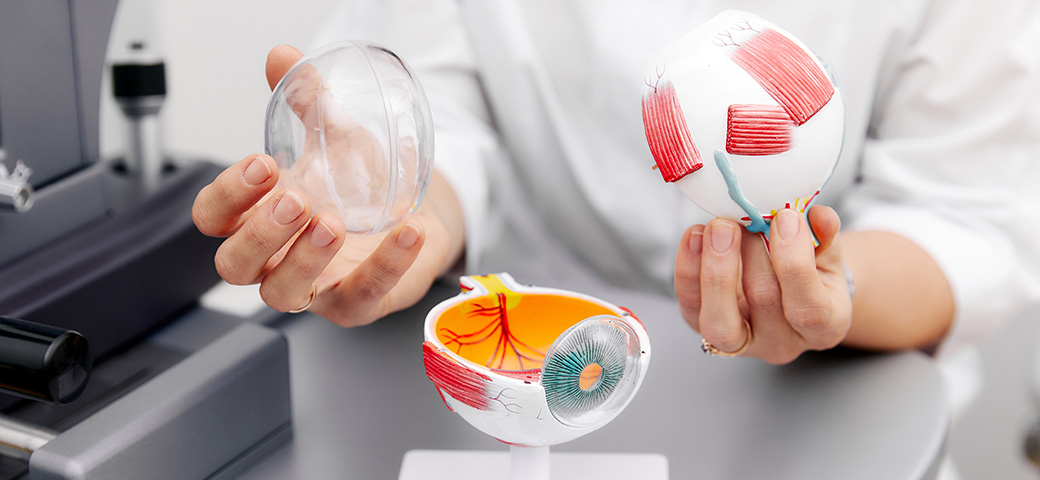Artificial Eye vs. Prosthetic Eye: What's the Difference?
Feb 10, 2025
TECHNOLOGY,INSIGHTSTerms like artificial eye, prosthetic eye, and synthetic eye are often used interchangeably, but they have distinct meanings. In this guide, we’ll explore the differences, types, materials, and customization options available for those in need of an ocular prosthesis.

Losing an eye can be a life-changing experience, but modern medical advancements offer several solutions for restoring both appearance and, in some cases, limited functionality. From custom-made ocular prostheses to innovative bionic implants, patients now have more options than ever to regain confidence and improve their quality of life.
What is a Prosthetic Eye?
It is a custom-made ocular device designed to replace a missing eye, primarily for cosmetic purposes. It does not restore vision but helps maintain the natural facial structure and symmetry. These prostheses are commonly crafted from medical-grade acrylic or glass, offering a natural appearance.
Types
- Glass Prosthetic Eye: Traditionally used in Europe, these eyes offer a highly realistic look but are fragile and need careful handling.
- Acrylic: More durable and commonly used, these eyes are lightweight, comfortable, and easier to maintain.
- Custom Ocular Prosthesis: Tailored to match the patient’s other eye, custom designs ensure a seamless blend with natural features.

What is an Artificial Eye?
It is a broader term that encompasses both cosmetic prosthetic eyes and bionic eye implants. Unlike a standard prosthetic, some incorporate electronic components that can assist in light detection or limited vision restoration.
Types
- Cosmetic: These are the same as traditional prosthetic eyes, made for appearance rather than function.
- Bionic Eye (Retinal Implants): Advanced devices that work with optic nerves to restore partial vision in patients with degenerative eye diseases.
Artificial Eyeball: How It Differs
The term is often used to describe a full spherical ocular implant, typically placed inside the eye socket to provide structure after eye removal (enucleation). It is different from a prosthetic eye, which covers the implant and serves as the visible part of the replacement. They are usually made from porous materials such as hydroxyapatite or polyethylene to allow tissue integration and movement. This integration helps the ocular prosthesis move naturally in coordination with the remaining eye, improving aesthetic and functional outcomes for the patient.
If you’re looking for the best clinics and specialists for a prosthetic eye, Wupdoc can help you compare options and make an informed decision. With detailed reviews, patient testimonials, and expert insights, Wupdoc ensures you find the most suitable provider for your needs.

The Process of Getting an Ocular Prosthesis or Prosthetic Eye
The journey to receiving an artificial or prosthetic eye involves several steps:
- Consultation & Eye Removal (if necessary) – In cases of severe trauma or disease, enucleation may be performed before fitting a prosthetic.
- Healing Period – After surgery, the socket is given time to heal before a prosthetic can be fitted.
- Customization – A custom ocular prosthesis is hand-painted to match the natural eye, ensuring a lifelike appearance.
- Fitting & Adjustments – The prosthetic is carefully shaped and fitted to provide maximum comfort and mobility.
Prosthetic Eye Costs in Different Countries
The cost of them varies depending on the materials used, customization level, and the country where the procedure is performed. Here are some approximate prices in different countries:
- Turkey: €1,200 – €2,500 (Affordable, high-quality custom)
- Spain: €2,500 – €4,000 (Well-known clinics with experienced specialists)
- Poland: €1,500 – €3,500 (Cost-effective and skilled ocularists)
- Germany: €3,500 – €6,000 (Premium custom prosthetics, advanced technology)
- UK: €3,000 – €5,500 (Higher costs due to specialized services and customization)
Each country offers different advantages, from cost savings in Turkey and Poland to high-end custom ones in Germany and the UK. Patients can choose based on their budget, quality expectations, and the level of customization required for the best aesthetic and functional results.

Caring for a Synthetic Eye
A synthetic eye requires regular cleaning and maintenance to ensure comfort and hygiene.
- Daily Cleaning: Remove and rinse with sterile saline or warm water.
- Professional Polishing: Recommended every 6-12 months to maintain a smooth surface.
- Handling with Care: Avoid dropping or scratching the prosthetic.
Choosing the Right Ocular Prosthesis
Selecting between a glass prosthetic eye and an acrylic one depends on lifestyle, durability needs, and personal preference. A custom ocular prosthesis ensures the best aesthetic outcome. Consultation with an ocularist (specialist in eye prostheses) is essential to determine the right fit.
Where to Get a Prosthetic Eye?
If you are considering an eye treatment, finding an experienced eye specialist is crucial. Platforms like Wupdoc can help you compare clinics, specialists, and treatment options worldwide, making it easier to find the best solution for your needs. Visit Wupdoc to explore trusted eye specialists for ocular prosthesis and other ocular treatments.
top 5 doctors & clinics in Prosthetic - Eyes:
 5.0Turkey, Antalya
5.0Turkey, AntalyaEye Care
Dr. Dorukcan Akıncıoğlu, a specialist in Smart Lens, NoTouch Laser, Lazy Eye, and a range of other eye conditions, offers expert care and innovative treatments. With a background in Gülhane Military Medical Academy, Dr. Akıncıoğlu has extensive experience in Orbital Tumors, Thyroid (Graves) Orbitopathy, Ectropion Correction, and more. His expertise also includes Entropion Correction, Eyelid Tumors, Eye Tumors, and Revision Eyelid Surgery. Dr. Akıncıoğlu is skilled in Orbital Decompression, Orbital Fractures, and treating Tear Duct Blockage. He specializes in addressing Congenital Face - Head Anomalies, providing Droopy Eyelid Treatment, and managing Facial paralysis. Additionally, Dr. Akıncıoğlu performs surgeries such as Movable Eye Prosthesis, Socket Reconstruction, Eyelid Reconstruction, Epithesis Surgery, and Orbital Reconstruction. Trust your eye care to Dr. Akıncıoğlu for personalized treatments and compassionate care.
# 1
 4.8Turkey, Antalya
4.8Turkey, AntalyaEye Care
Established in 1991 in Antalya, the Orbit Medical Centre offers top-notch medical services to the city and the Mediterranean region. The Centre's emphasis on collective efforts and professional interdependence has earned it a reputation as the premier ophthalmological care provider in the region. With its advanced infrastructure, the Centre's ophthalmologists share their knowledge and experience, with particular focus on excimer laser, cataract, glaucoma, keratoconus, and diabetic treatments. The Centre upholds ethical and deontological principles, and prioritizes patient treatment over commercial interests, resulting in patients' trust and establishing the Centre as a model organization.
# 2
 5.0Turkey, İstanbul
5.0Turkey, İstanbulEye Care
Assoc. Prof. Dr. Korhan Fazıl, a distinguished specialist born in Balıkesir in 1979, brings exceptional expertise and a compassionate approach to his practice. Graduating from Hacettepe University Faculty of Medicine in 2003, Dr. Fazıl specializes in a range of eye-related conditions, offering advanced treatments and personalized care.With a focus on improving patients' quality of life, Dr. Fazıl specializes in eyelid aesthetics, droopy eyelid (ptosis), eye contour aesthetics, and various other eye conditions. His expertise extends to lacrimation (watery eyes), orbital diseases, thyroid-related eye disease (thyroid ophthalmopathy), and prosthetic eye fittings.Dr. Fazıl is dedicated to providing comprehensive eye care, including pediatric eye diseases, ocular surface diseases, cataract, glaucoma, and refractive defects.
# 4
 5.0Turkey, İstanbul
5.0Turkey, İstanbulEye Care
Op. Dr. Alim Huseynov, a distinguished ophthalmologist, graduated from Azerbaijan Medical Faculty in 2010 and completed his specialization in ophthalmology at Baku National Ophthalmology Center. With extensive expertise in a range of eye surgeries, Dr. Huseynov offers advanced treatments in refractive laser eye surgeries, including iLASIK (Femto Lasik), LASIK, LASEK, Trans Epithelial PRK (NO TOUCH), and SMILE.His proficiency extends to pterygium and eyelid (bird wing) surgeries, dry eye disease treatments, and strabismus surgery. Dr. Huseynov is also skilled in oculoplastic surgery, addressing ectropion and entropion surgeries (eyelid deformity treatments), and performing enucleation and evisceration prosthetic eye surgeries.
# 5
Get a Free Quote
Let Us Help You Find the Best Doctors for Your Needs
Fill out the form, and an assistant will contact you shortly to discuss your needs and guide you to top specialists.

Table of Contents
read this next:
May 20, 2024
TECHNOLOGY,HEALTHThe Future of Eye Health: Smart Contact Lenses
Smart contact lenses are poised to become the ultimate wearable, offering a glimpse into a future where technology seamlessly integrates with our biology. Forget corrective lenses of the past, these next-gen marvels promise to be health monitors, discreet displays, and a treasure trove of data about your ocular health, all wrapped up in a comfortable, invisible package. Buckle up, because the future of eye care is about to get fascinating!
Looking for the Right Treatment?
Let us find the best doctors & clinics you need. Get your free quote today!
Get a Free Quote

